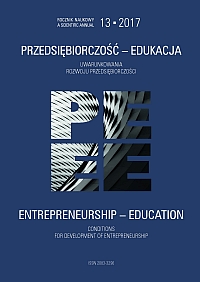Zespół Szkół Akademickich Politechniki Wrocławskiej as a Zone of Constructive Thinking
DOI:
https://doi.org/10.24917/20833296.13.34Keywords:
academicism, extended education offer, patronage school, school inventoryAbstract
The idea of patron classes is used not only in Western schools. It is utilized also in Polish facilities. Some companies do not take care of just single classes, but also whole schools. The Academic School Complex at the Wroclaw University of Technology is an example of such a facility. This article summarises the history of ASC, its mission, and also, implicitly, the idea of patron schools and how they work. In order to show these aspects, the beginning will cover the educational inventory and the most important subjects taught in this school. The summary also contains the list of optional classes and describes the importance/role of after-school activities in educating young people. These topics are added in order to describe ASC as accurately as possible. There is also a brief analysis of the relationship between the ASC and the University, according to empirically gathered knowledge. The influence this relationship has on the school and its was checked in keeping with the “academicism” of the school as the main analysis factor.References
Arkabus, A., Płusa, A. (2016, 24 października). Jak pomóc szkole w zainteresowaniu uczniów książką?. Pozyskano z: https://www.doskonaleniewsieci.pl/Upload/Files/1/samouczki/poradnikbiblioteki/modul_V/ekran3/PLusa_Arkabus.pdf
Brzezińska, A.I. (2009). Nauczyciel jako organizator społecznego środowiska uczenia się. Forum Dydaktyczne: przeszłość, teraźniejszość, przyszłość, 5–6, 6–19.
Brzezińska, A.I., Appelt, K. (2013). Tutoring nauczycielski – tutoring rówieśniczy: aspekty etyczne. Forum Oświatowe, 25, 2(49), 13–29.
Budnikowski, A., Dabrowski, D., Gąsior, U., Macioł, S. (2012). Pracodawcy o poszukiwanych kompetencjach i kwalifikacjach absolwentów uczelni – wyniki badania. eMentor, 4(46), 4–17.
Hermann-Pawłowska, K., Leszczyńska, B., Trzciński, R., Sondej K., (2015). Współpraca pomiędzy uczelniami a pracodawcami w zakresie kształcenia praktycznego studentów. W: K. Hermann-Pawłowska, B. Leszczyńska, R. Trzciński, Sondej K., (2016) Badanie ewaluacyjne o charakterze on-going identyfikujące dobre praktyki w realizacji praktycznych elementów kształcenia w projektach dofinansowanych w ramach IV Priorytetu PO KL oraz w innych działaniach w obszarze szkolnictwa wyższego. Wierzbica: Fundacja Idea Rozwoju. Pozyskano z: http://www.ncbr.gov.pl/gfx/ncbir/userfiles/_public/fundusze_europejskie/kapital_ludzki/ewaluacja/praktyczne_elementy_ksztalcenia_-_ewaluacja.pdf
Słownik języka polskiego PWN. Hasło: akademicki. Pozyskano z: http://sjp.pwn.pl/sjp/akademic- ki;2549148.html
Własak, J. (2012) Co zrobić, aby fizyka była lubiana? Pozyskano z: http://www.przedmiotyscisle.pwr.edu. pl/files/prv/id102/prezentacje/2012/Jacek_Wlasak.pdf
Zioło, Z., Rachwał, T. (2007) Rola przedsiębiorczości w aktywizacji gospodarczej. Przedsiębiorczość – Edukacja, 3.
Downloads
Published
How to Cite
Issue
Section
License
Articles are published under the terms of the Creative Commons License (CC BY-ND 4.0; Attribution– NoDerivs).

